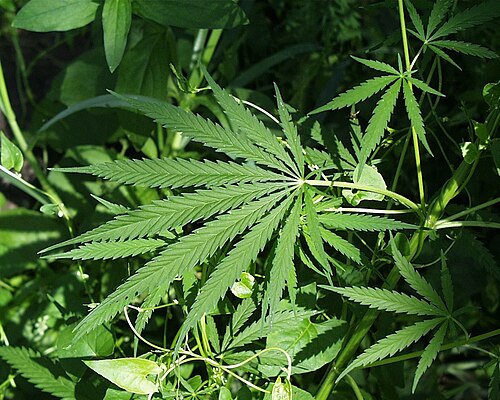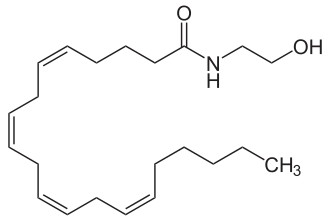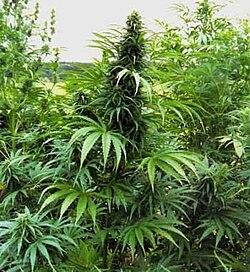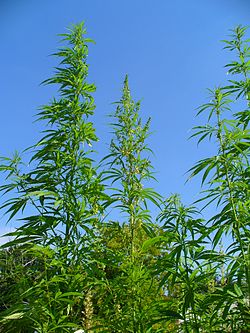User:Jukeboksi/Wiki.study/Natural therapeutics
Cannabis is the oldest and most versatile medicine known to man.

Endocannabinoid receptors and endocannabinoids
Main article in wikipedia Endocannabinoid system
Human cells may have either of 2 types of endocannabinoid receptors CB1 and CB2. These receptors are present also in cells far away from the brain.

Endocannabinoids are produced by our own bodies the main ones being Anandamide and 2-AG.
Anandamide
- Anandamide was discovered in 1992. The name comes from the Sanskrit word 'Ananda' meaning 'bliss' and amide from its chemistry.
2-AG
- 2-AG was discovered in 1994-1995.
About 2-AG
N-Arachidonoyl dopamine
- N-Arachidonoyl dopamine discovered in 2000.
2-Arachidonyl glyceryl ether
- 2-Arachidonyl glyceryl ether discovered in 2001.
Virodhamine
- Virodhamine discovered in 2002
Lysophosphatidylinositol
- Lysophosphatidylinositol is a contender to be the 6th endocannabinoid.
Cannabis


Cannabis sativa and Cannabis indica are the main cannabis variants though most strains are mixes of these. A third cannabis line is the Cannabis ruderalis, a rugged nothern cannabis that has adapted to flower even under northern long summer days.
Phytocannabinoids

Many people may know the 2 most prevalent phytocannabinoids, THC and CBD.
Full list of known phytocannabinoids from Wikipedia:
- THC (Tetrahydrocannabinol)
- THCA (Tetrahydrocannbinolic acid)
- CBD (Cannabidiol)
- CBDA (Cannabidiolic Acid)
- CBN (Cannabinol)
- CBG (Cannabigerol)
- CBC (Cannabichromene)
- CBL (Cannabicyclol)
- CBV (Cannabivarin)
- THCV (Tetrahydrocannabivarin)
- CBDV (Cannabidivarin)
- CBCV (Cannabichromevarin)
- CBGV (Cannabigerovarin)
- CBGM (Cannabigerol Monomethyl Ether)
- CBE (Cannabielsoin)
- CBT (Cannabicitran)
THC
Tetrahydrocannabinol is the psychoactive compound that brings the 'high' most recreational users are chasing.
THCA
THC is produced from the raw THCA by a process called de-carboxylation. Basically means to heat the stuff over certain temperature.
CBD
Cannabidiol has the most medical applications of all phytocannabinoids.
CBDA
Cannabidiolic Acid is the raw form. Decarboxylating CBDA yields CBD.
CBN
CBG
CBC
CBL
CBV
THCV
CBDV
CBCV
Cannabichromevarin
CBGV
Cannabigerovarin
CBGM
Cannabigerol Monomethyl Ether
CBE
Cannabielsoin
CBT
Cannabicitran
Treating somatic issues
Cannabis can be applied to treat a wide assortment of illnesses. In this case it is called medical cannabis.
Due to the inbuilt default to always take the safe route and also to backup the back of your fellow MD colleague the Wikipedia does not yield the right infos on how useful and versatile a medication cannabis is.
Research has been held back by arcane laws even as cannabis is the oldest medicine known to man and it should be gladly appreciated and not outlawed because of big pharma interests.
Pain treatment
“You just don't feel like thinking about the pain.”
“There is more to it than that.”
Epilepsy
Cannabis can be used to treat epilepsy.
Phytocannabinoid treatment of cancers

Internet is rife with stories about winning the battle against cancer with the help of exocannabinoids. What does the science say?
4 points how cannabis works against cancer compiled by herb.co
- Anti-proliferative - cannabis is against tumor growth
- Anti-metastatic - cannabis is against cancer spreading to other parts in the body because of metastatic activity
- Anti-angiogenetic - cannabis is against new blood vein growth to tumor
- Apoptotic - cannabis causes cancer cells to programmedly kill themselves via Apoptosis.
Phytocannabinoids are harmless to healthy cannabinoid receptor containing cells.
Additionally anecdotally true are
- Cannabis works very well against the somatic and nonsomatic pains brought on by cancer
- Cannabis can help maintain a good appetite, chemo or no chemo.
On the Internet about phytocannabinoid treatment of cancers
- http://www.calgarycmmc.com/c.htm index into studies about the health benefits of cannabis, letter 'c' lists cancers for which studies have been done.
- http://www.leafscience.com/2013/10/14/cannabinoids-destroy-leukemia-cells-new-study-finds/
Videos on the Internet about phytocannabinoid treatment of cancers
- Dr. Cristina Sanchez interview where she expains how apoptosis makes cancer cells kill themselves (a molecular biology research scientist who did her doctorates on exocannabinoids and cancers)
- Dr. Cristina Sanchez on how cannabinoids work against cancers
- Dr. Cristina Sanchez at Cannafest Prague 2015
- Dr. Cristina Sanchez lecture in Australia (no slideshow shots, sorry)
Treating non-somatic issues
Cannabis can help with various non-somatic problems such as psychiatry, depression and PTSD.
External links
- http://www.calgarycmmc.com/ a large compendium on medical cannabis sorted alphabetically by ailment.
- http://www.encod.org/info/700-MEDICINAL-USES-OF-CANNABIS.html
- http://expand-your-consciousness.com/100-scientific-studies-agree-cannabis-annihilates-cancer/ about 100 nig.gov studies linked some cases briefly described.